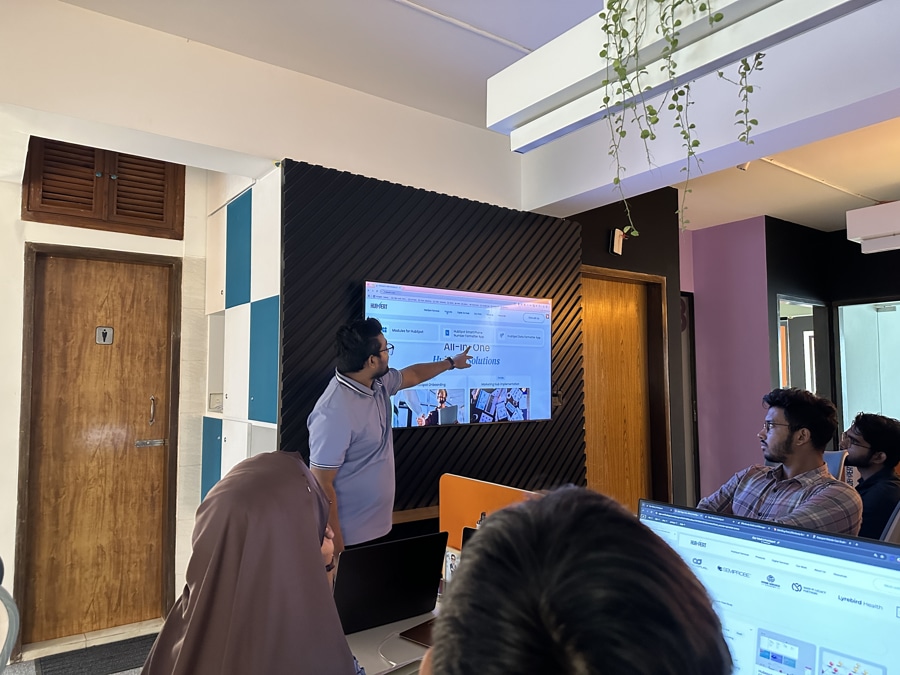
The numbers tell a compelling story. According to UNESCO data, 52,799 Bangladeshi students studied abroad in 2023, with the United States being the top destination (8,524 students), followed by the UK (6,586) and Canada (5,835).
This represents significant growth from earlier years, with the number of students going abroad having tripled over the past 16 years.
Behind these statistics lies an industry that barely existed two decades ago: education consulting.
Companies like Adroit Education, which sends students from Bangladesh to Grade A universities in the US and Canada, Mentor, and many other consulting agencies, represent a new category of business built on a simple premise: helping middle and upper-middle-class families navigate the complex world of international admissions.
These firms run nine-month to year-long programs, essentially functioning as bridge-builders between Bangladeshi students and foreign universities.
The business model is straightforward and profitable. Agencies charge substantial fees—often $2,000 to $5,000 per student—for services ranging from university selection to visa processing.
The market has responded accordingly. Some firms now operate 10 branches across Bangladesh, with additional offices in Pakistan, Indonesia, and Arab countries. It's a gold rush of sorts, except the gold is information and guidance.
But there's a problem lurking beneath this success story, one that Fazle Rabbi, COO of Hubxpert, sees repeatedly when consulting agencies approach his firm.
Despite healthy revenues, these businesses are hemorrhaging money through operational inefficiencies that would be unthinkable in other industries.
The most immediate issue is straightforward: agencies are losing potential customers at an alarming rate. "If we receive 50 leads via Facebook or Messenger, and a team member forgets to input them into the CRM, they're lost," Rabbi explains. This isn't a hypothetical scenario—it's happening daily across the industry.
The scale of this problem becomes clear when you consider the lead generation mechanics of education consulting. A single education fair might generate 100 leads. Digital campaigns pull in dozens more each week. But most agencies still manage these leads using Google Sheets or basic custom-built systems that create multiple points of failure.
The human factor amplifies the problem. When a student who contacted an agency six months ago reaches out again, the typical response is starting from scratch. "If they knocked us on Facebook six months ago... and six months later they knock again, they are asked all the questions from the beginning," Rabbi notes. The student experience becomes frustrating, and conversion rates suffer accordingly.
Consider the mathematics: if an agency with 500 monthly leads loses 30% due to poor follow-up systems—a conservative estimate based on Rabbi's observations—they're losing 150 potential students.

The second major inefficiency involves the handoff between sales teams and educational consultants. Most established agencies employ dozens of specialized consultants—Rabbi mentions one firm with 50 consultants in Dhaka alone—who provide detailed guidance on university selection, application strategy, and program fit.
The current process is painfully manual. When a lead requests consultation, "if they use Google Sheets, they'd send an email about a new student requiring consultation. The consultant would reply to the email, and there would be a back-and-forth communication." If the consultant doesn't respond immediately, opportunities vanish quickly.
"If the consultant isn't available or replies three days later, in the meantime, the lead might be lost, or we have to wait three days to assign it to someone else. Within those three days, another consulting firm might contact them," Rabbi explains. In a competitive market where students often engage multiple agencies simultaneously, speed determines winners and losers.
This bottleneck is particularly costly because consultation requests typically indicate serious interest. These aren't casual inquiries—they're warm leads ready to move forward. Losing them to operational delays represents the worst kind of business inefficiency.
Education consulting involves extended relationships with multiple touchpoints across various platforms. Students might initiate contact through Facebook, switch to WhatsApp for quick questions, use email for document submissions, and prefer phone calls for complex discussions.
Each platform contains part of the story, but no single system captures the complete relationship.
"If someone manages leads using an Excel sheet, they have to go to their email to send emails, or use their phone to make calls or send messages. All this data remains separate," Rabbi observes. The result is fractured communication that creates poor customer experiences and internal confusion.
The problem intensifies with team handoffs. When a sales representative transfers a lead to a consultant, then later to the documentation team, and finally to the visa processing unit, critical information gets lost. Each team member starts partially blind, asking questions that may have been answered weeks earlier.
Perhaps most damaging is the near-complete absence of meaningful performance data. Most agencies cannot answer basic business questions: Which marketing channels generate the highest-converting leads? Which consultants have the best success rates? What's the typical timeline from initial contact to enrollment?
This information vacuum makes optimization impossible. Agencies continue spending on ineffective marketing channels while underinvesting in successful ones.
High-performing consultants aren't recognized or replicated. Bottlenecks persist because they're invisible in aggregate data.
Rabbi regularly encounters agencies that have been operating for years without knowing their true conversion metrics. "From which channel how many leads were generated, how many customers converted from those leads, how many were lost, what were the reasons for loss—everything" remains unmeasured and therefore unmanaged.
HubSpot addresses these problems through integrated systems that eliminate the gaps between lead capture, relationship management, and performance tracking.
The platform functions as both a safety net—preventing leads from falling through cracks—and an optimization engine that continuously improves performance.
The lead management transformation is immediate and dramatic. Every inquiry, regardless of source, automatically enters the system with complete attribution.
"HubSpot acts as a smart CRM that prevents lead loss," Rabbi explains. More importantly, it maintains a complete interaction history, so when students return months later, the entire relationship context is immediately available.
Lead prioritization becomes systematic rather than intuitive. When an agency collects 100 leads from an education fair, the system can automatically score them based on predetermined criteria.
"I have some data—he's a student, he just finished inter-level, he lives in Gulshan, Dhaka. If I have 10 such criteria, I can give them high priority for calls because they live in Gulshan, suggesting they have financial means," Rabbi describes.
Team members can then focus on high-probability leads first, maximizing conversion rates.
The consultant-student bridge problem disappears entirely through automated scheduling systems. "When a lead comes in needing a consultation, we have 10 consultants, and their availability is displayed. We can see who is available when.
Based on their schedule and calendar, the link for the meeting will automatically be forwarded," Rabbi explains. The three-day window of vulnerability closes completely.
Communication consolidation happens naturally through HubSpot's unified interface.
"We can directly send emails, WhatsApp messages, SMS, and even make calls from the platform. It's an easy way, and everything is beautifully tracked in history."
Every interaction becomes part of a single, searchable record that any team member can access instantly.
The reporting capabilities transform business intelligence from guesswork to precision. Agencies can finally track "how many consultations a consultant has given, and how many students converted as a result. We can track the consultant's activities, as well as our team members' activities: how many customers they've converted, how many leads they've converted."
Channel attribution becomes clear and actionable. The system reveals exactly "from which channel how many leads were generated, how many customers converted from those leads, how many were lost, what were the reasons for loss, from which areas they were lost."
This intelligence enables rapid optimization of marketing spend and operational processes.
Performance patterns emerge that were previously invisible. Agencies discover which consultants excel with specific student profiles, which marketing messages generate the most qualified leads, and where bottlenecks actually occur in their processes.
These insights compound over time, creating sustainable competitive advantages.
Education consulting faces a unique challenge: convincing families to invest significant money in services that are largely intangible and outcomes that are uncertain. Building trust becomes essential for growth, but most agencies approach this challenge haphazardly.
HubSpot's Marketing Hub enables systematic trust-building through automated reputation management.
"Whenever a customer converts, an automatic email will go to them saying, 'Please give us a review. If you give a review, you'll get a $10 gift,'" Rabbi explains. The system manages multiple follow-ups and incentives, gradually building a repository of authentic testimonials.
The platform also enables sophisticated personalization that demonstrates expertise and attention to detail. When students browse specific program pages, they receive targeted information about those exact programs.
"If they're browsing our UK product page, we can send them a personalized message specific to the UK, saying, 'You're interested in going to the UK. Here are these features and lists you might want to see.'"
This level of personalization was impossible with traditional systems, but becomes automatic with proper CRM implementation, creating experiences that feel consultative rather than promotional.
The most elegant software becomes worthless without proper implementation, particularly in markets with specific execution and cultural requirements. We have written about this before:
“Many companies purchase CRM software but fail to see results because of the implementation gap. They often lack a clear implementation plan aligned with business objectives. Fail to properly train team members. Don't customize the system to match their specific workflows. And can't effectively interpret and act on the data collected."
Rabbi regularly encounters this gap when agencies attempt self-implementation or work with consultants who lack an understanding of the context and business practices.
"In Bangladesh, IP calling isn't effective due to regulations," Rabbi notes, referencing complications that arose after aggressive telemarketing practices damaged the industry's reputation. These local nuances require expertise that generic implementations cannot provide.
Hubxpert has built its practice around solving these localization challenges while maintaining the full power of HubSpot's capabilities. As Bangladesh's first Platinum HubSpot Partner—a designation held by less than 1% of HubSpot partners globally—the firm combines technical expertise with a deep understanding of local market dynamics.
"We have a local team that can provide in-person training until their team learns HubSpot and becomes proficient in their industry space," Rabbi emphasizes.
This hands-on approach addresses the reality that most education consulting agencies lack internal technical resources to manage complex software implementations independently. From the article we mentioned earlier:
“For cash-conscious companies, the obvious question is, why not handle implementation internally? Why pay a partner when the information needed to configure HubSpot is theoretically available online?
The answer comes down to specialized expertise. Partnerships with specialized agencies like Hubxpert often deliver significantly better outcomes than in-house attempts. Effective implementation often requires multiple skill sets: marketing expertise, sales process design, technical development, and change management.
While some companies attempt to hire dedicated HubSpot specialists, these individuals rarely possess the comprehensive expertise that comes from implementing the platform across dozens of different businesses. Implementation partners bring pattern recognition—they've seen what works and what doesn't across numerous clients. Experienced implementation partner provides cross-functional expertise, proven methodologies, and battle-tested implementation frameworks rather than learning through trial and error.
Additionally, agencies like Hubxpert come with training capabilities to ensure team adoption through structured education and ongoing optimization by continuously refining the system based on performance data. The investment in expert implementation often pays for itself through accelerated time-to-value and avoidance of costly mistakes.”

The financial case for CRM implementation becomes compelling when viewed against the cost of current inefficiencies.
Rabbi regularly encounters agencies losing 30% or more of their leads to poor follow-up systems. For a typical mid-sized agency processing 200 leads monthly with $3,000 average customer value, that represents a significant lost monthly revenue.
HubSpot's Sales Hub Professional, which addresses the most critical operational problems, costs roughly $2,000 monthly for a typical agency. The breakeven point requires preventing the loss of less than one student per month.
Most agencies Rabbi works with recover their investment within weeks of implementation.
The resistance typically comes from senior management rather than operational teams. "Their marketing and sales teams were very interested, but the decision-makers didn't proceed," Rabbi observes about several recent prospects. This resistance reflects generational differences in technology adoption rather than rational economic analysis.
"CEOs are quite old-school," Rabbi notes, describing decision-makers who view CRM systems as "just an unnecessary cost increase" rather than revenue optimization tools. This perspective ignores the reality that traditional methods are already costing more than modern solutions would.
The education consulting market in Bangladesh is approaching a maturation point where operational excellence will increasingly determine market winners.
Early entrants succeeded largely through market timing and basic service delivery. The next phase will reward agencies that can deliver superior customer experiences while operating at higher efficiency levels.
Agencies implementing sophisticated CRM systems gain multiple competitive advantages: faster response times, more personalized service, better follow-up consistency, and data-driven optimization. These advantages compound over time, creating sustainable differentiation that's difficult for competitors to replicate quickly.
The window for gaining these advantages is narrowing. As more agencies recognize the importance of operational systems, the competitive benefit of early adoption diminishes.
Agencies that delay implementation risk falling behind competitors who are already optimizing their operations through better data and automation.
The education consulting industry in Bangladesh has evolved from a cottage industry serving a few wealthy families to a significant sector processing billions of dollars in annual transactions. This growth trajectory will continue as more middle-class families view international education as accessible and necessary.
However, the next phase of growth will require operational sophistication that matches the industry's financial scale.
Agencies that continue relying on Google Sheets and manual processes will find themselves increasingly uncompetitive against firms that have invested in proper systems and data-driven optimization.
The choice facing agency owners is straightforward: invest in operational excellence now, while the advantages are still significant, or gradually lose market share to competitors who are already making these investments. In a market where student success depends on agency performance, there's ultimately no choice at all.
The business of dreams requires systems worthy of those dreams. For Bangladesh's education consulting industry, that transformation is no longer optional; it's essential for survival.
